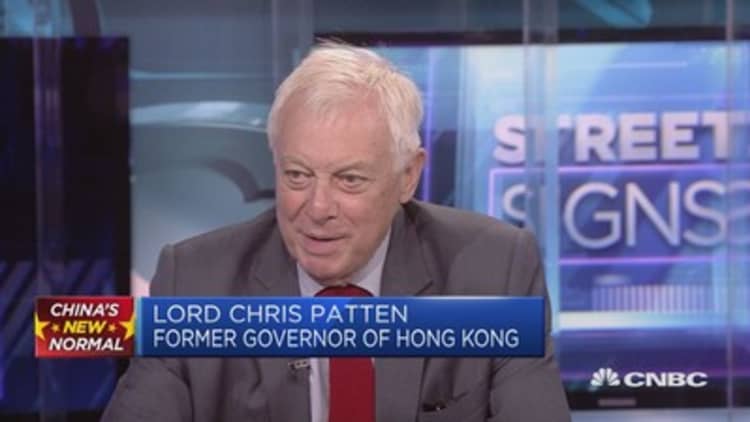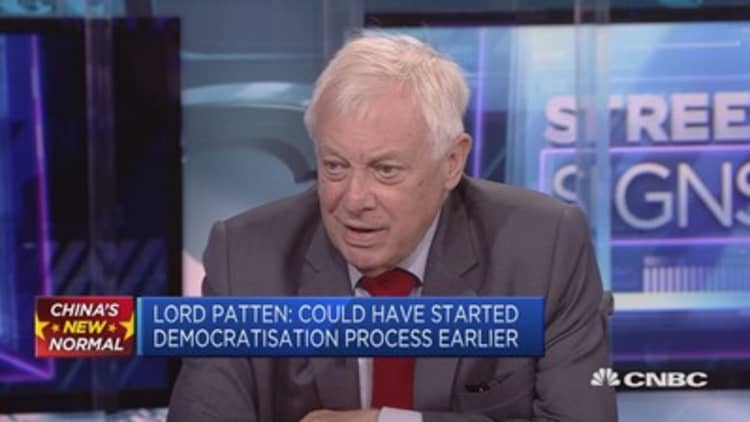Chinese President Xi Jinping touched down Thursday in the Special Autonomous Region of Hong Kong. Xi is there to mark 20 years on July 1 since the city's handover from former colonial power the U.K., and was greeted by scores of children dutifully waving the red flags of China and Hong Kong.
According to Lord Chris Patten, the last British governor of Hong Kong, whether the Middle Kingdom honors the conditions of Hong Kong's 50 year handover agreement will be indicative of its wider foreign policy in the future.
"The way China behaves in Hong Kong will give us all an indication of how much you can trust China in the century ahead," Patten told CNBC's Street Signs Thursday. The former Conservative party politician deemed the relationship between the world's second largest economy and a city regarded as one of the world's freest economic environments as a "test case" on "whether China keeps its word."
Hong Kong's 'one country, two systems' declaration, ratified in 1997, decrees that the "way of life (in the city) shall remain unchanged for 50 years." It assures Hong Kong a level of autonomy away from the central government in Beijing and safeguards its capitalist economic system. But, another key tenet of the so-called Basic Law is democratically electing leaders through universal suffrage.

Some perceive China's influence encroaching on the city, for example in the vetting of candidates for its chief executive leadership position and other political posts. Certain voices argue that the police responds to dissent with a heavy hand.
Patten was skeptical as to whether China could be trusted on the matter of Hong Kong, saying instead: "I think the jury's out on that." He cited what he viewed as China's slippery commitment to World Trade Organisation rules as an example of the country pursuing its own agenda.
But disregarding Hong Kong's provisional autonomy could mean serious repercussions for the superpower, as "people will be very reluctant to take (China's) word on other matters," Patten warned.
Pro-democracy campaigners in Hong Kong have shouted increasingly loudly in recent years, with this reaching a crescendo during the 2014 Umbrella Movement in which tens of thousands of students blocked central areas. Some leaders of this movement were elected onto the city's Legislative Council in September 2016.

"People in Hong Kong have a real sense – I think it's in their DNA – of the relationship between freedom, pluralism, democracy and prosperity, and what's interesting is that it's not just older people, (but) young people as well," Patten said. He argued that their sense of a hybrid Hong Kong-Chinese identity was important.
'Hong Kong is still one of the freest cities in Asia'
Patten posited that China wants Hong Kong to become just another southern Chinese city, arguing instead that "Hong Kong is about greater accountability, about the rule of law, (and) about the freedom of speech."
He has given his support to young pro-democracy protesters in the city, describing them as "incredibly brave" and "absolutely right to argue about greater democracy." But, Patten warned that the movement risks diluting support for its cause if it blurs into latent sentiment for independence.
Hong Kong's potential to be an independent city state was dismissed by Patten as "never going to happen," and that any campaign advocating this in fact "plays into the hands of the hard liners in Beijing."
Reflecting on the process of returning the former British outpost to China, Patten said that: "I think that we could have started on the process of democratization earlier, back in the 1980s, when we said that one of the guarantees of how Hong Kong would continue to be free should be the development of democracy."
But for Patten, the tide in favor of Hong Kong's democracy was ultimately quelled at the time by China, fearful that the city would become independent like Singapore.
"The Chinese have spent a lot of time talking about 'one country, two systems,' without ever having made the effort to understand what it means," Patten said. "Hong Kong is still one of the freest cities in Asia, no question about it, and that's how people would like it to remain," he said.
"I've never been against helping China to become a modern economy," Patten said. "What I'm not in favor of is kowtowing to China," he added.

